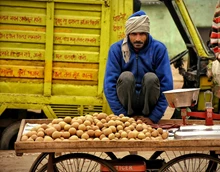
According to N K Singh, Chairman of the Fifteen Finance Commission, the principles guiding the GST council's successful operation can be applied to other facets of the Indian economy, particularly the social sector and, more crucially, the digital economy.
In his remarks at the CII Global Economic Policy Summit in New Delhi, Singh stressed the importance of the Indian states' active participation in achieving India's net zero commitments. He continued by saying that reducing the risks associated with this transition would be a top priority and that it was crucial to develop a system allowing the states to participate in the procedure actively.
He was speaking at the Confederation of Indian Industry event's session on "Centre-State Partnerships: Reforms, Exports, and Sustainability." According to Singh, "the orderly transition from the era of fossil fuels to renewable energy is a daunting challenge."
He stated that in decarbonization, the crucial choice would be regarding the types of taxes that can be assessed and the advantages these taxes would bring in aiding decarbonization. All taxes on fossil fuels must facilitate India's transition to a green economy. According to this statement, "changing agricultural patterns will be crucial to reducing fossil fuel use and assisting in the green transition."
Singh noted that only six states account for 80% of India's exports, with the remaining 22 states contributing very little to the country's total exports. "Incentivization is necessary to harness and improve India's export capabilities," Singh emphasized. While noting that the Northeastern region has significant potential to become a significant export multiplier, he continued by saying it is important to include the states that are not participants.
Although urbanization is a key growth driver, Singh warned that disorderly urbanization patterns might limit future growth. He suggested that a substantial grant for seed capital can help to facilitate the creation of new cities, which the ministry of urban development must consider for reducing unplanned urbanization. He noted that incubating new urban cities is a topic that merits considerable attention.
Singh proposed that property tax could be a significant source of income for urban local governments, which have difficulty generating significant amounts of money. Additionally, he suggested that panchayats that align with national priorities receive tied rather than untied grants. To strengthen the states' intellectual capacity or domain expertise, he also emphasized the significance of having at least one think tank or research organisation at the state level.
Singh applauded the government's most recent efforts to address the problems facing India's power sector. He added that there will probably be some positive effects from the legislative changes made to address the problems with unpaid dues and other issues in the power sector.











